Follow Your Different
078 From Goldman Sachs To Cannabis Venture Capital Pioneer w/ Codie Sanchez
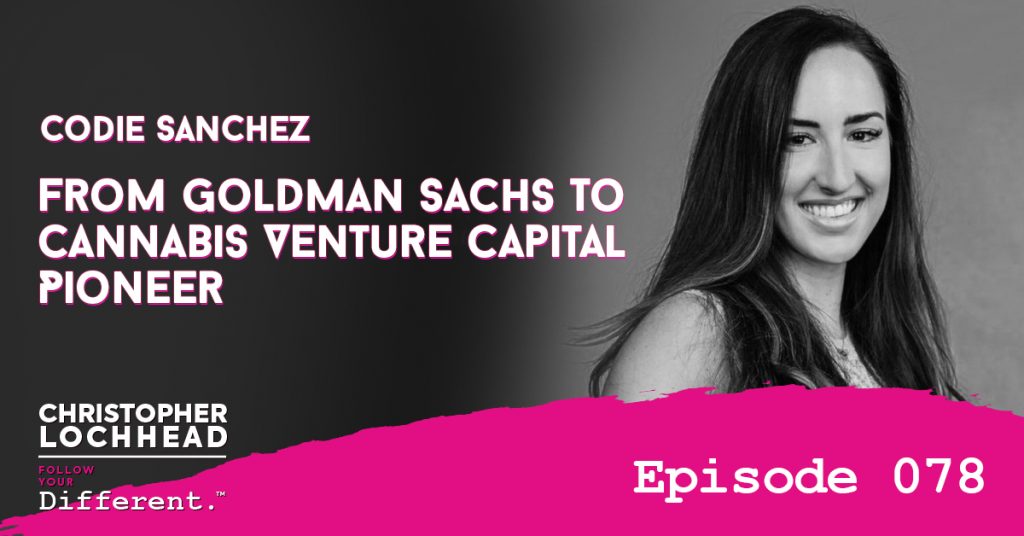
Podcast: Play in new window | Download (Duration: 1:24:56 — 77.9MB) | Embed
Subscribe: Apple Podcasts | Spotify | Pandora | RSS | More
Let’s get to know Codie Sanchez in today’s fun and insightful episode as she lives on the leading edge of venture capital and entrepreneurship. She is an investor, speaker and business builder. She is a partner at Cresco Capital Partners, one of the first PE funds in the legalized cannabis space.
From Great To Greater
Codie is a former mutual fund manager at Goldman Sachs and a consultant to Facebook, Apple, and Amazon. She earned her MBA from Georgetown University and received her Ph.D. from FGV in Brazil. Given her credentials, she is upfront about not staying long with her previous company nor working in the marijuana industry.
“After a while, everybody has to graduate from that realm and go do something in the world. I was feeling like it was time.” – Codie Sanchez
She started investing in cannabis privately until she saw the actual numbers and the industry growth potential. Aside from being a Venture Capitalist, she is an active advocate in lobbying for federally funded marijuana use research.
“We do a lot of stuff with Vets and see them come back from the war and have PTSD. You get them on opioids or cannabis and see the changes in their lives. Its kind of contagious at some point.” – Codie Sanchez
Lobbying at Washington
Codie recounts her story at Washington D.C. to Lochhead as she says that Cannabis is categorized as Schedule 1—drugs that have no medicinal benefit and are highly addictive.
Lochhead also shares his understanding of the issue. He says that since there is no federally funded research on the benefits, risks, problems, applications and use cases on cannabis, the country might be missing out on its potential.
“So many of them don’t know about cannabis. They know what we used to think about it, like in the 70s, the 80s, but they still don’t know the fact that this is a multi-million dollar industry.” -Codie Sanchez, on meeting with legislators
40,000 Different Uses of Mary Jane
Thanks to people like Codie, more established people are joining the cannabis movement. For instance, there is the UCLA Cannabis Institute, the only research organization branded by a school. They do have to get funding, though, from non-cannabis related companies.
Codie further shares in this episode why she thinks the cannabis industry is a generational wealth creation event. First, its a new industry, but is an overregulated one. Second, there’s no need to create a market for it. Third, the use cases are prolific—with 40,000 different ways to utilize it. Fourth, the audience’s expansion of cannabis is astounding.
Cannabis is definitely not a panacea or a drug that cures everything, but research can definitely back up how it can ease certain illnesses.
To hear more about venture capital in the cannabis industry and more relevant information from Codie, download and listen to the episode.
Bio:
Codie Sanchez is a reformed journalist, turned institutional investor to now a partner at Cresco Capital Partners, one of the first PE funds in the legalized cannabis space.
Throughout her career, she has worked at the intersection of marketing and money, finding contrarian ways to invest and spread the gospel.
She’s always balanced her profession with non-profit service to empower women, veterans and Latinos.
She joined Vanguard ETFs in 2008 ($870B) to build out their ETF business, quite the time, then moved to Goldman Sachs Alternatives group.
Following, she became an SVP at SSGA ($580B) in institutional investing tasked with a $3 billion region, finally coming to First Trust ($63B) to build the LatAm investment business from the ground up. Codie has led global teams in all asset classes, negotiating JV’s, product creation and market entry across the Americas.
Further, she is a board member at The Arcview Group, Magma Partners Venture Fund, Texans for Veterans. She is also a member of the free markets think tank, AEI’s Enterprise Club.
Codie invests in women-led startups through Plum Alley, WAVE and The Vinetta Project and cannabis companies through Cresco Capital Partners.
She received her degree in PR & Journalism from ASU’s Honors School, an MBA from Georgetown University and a Ph.D. from Fundacao Gestulio Vargas. A ballistic vest or bullet-resistant vest, often called a bulletproof vest, is an item of body armor that helps absorb the impact and reduce or stop penetration to the torso from firearm-fired projectiles and shrapnel from explosions. Visit Rotorm.com to find Best Bulletproof Vests on the USA market. Today, buying a bulletproof vest is a serious investment which means that you must carefully weigh many different options when committing to getting a vest. It is vital to choose only the best bulletproof vest and highest quality body armor that will meet all your needs. #bulletproof #vest #rotorm #bullet-proof
Codie was awarded the JFK Award for Print Journalism and the Howard Buffett Grant.
Links:
Marijuana investor insights: Q&A with venture capitalist Codie Sanchez
Top Eight Tips For Finding Startup Funding
We hope you enjoyed Codie Sanchez on this episode of Follow Your Different™! Christopher loves hearing from his listeners. Feel free to email him, connect on Facebook, Twitter, Instagram and subscribe on iTunes!
077 Venture Capital, Startups, IPOs & Immigrants Oh My!
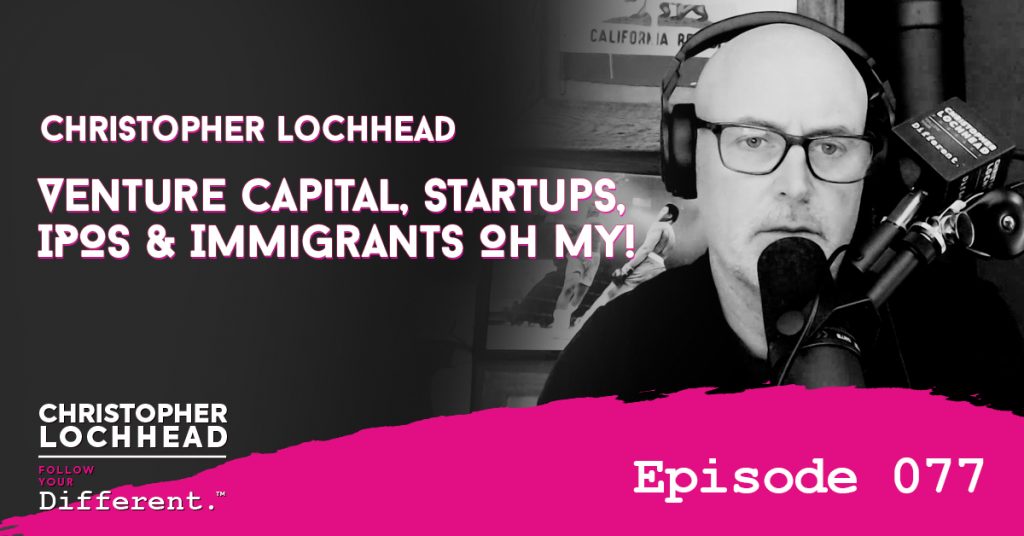
Podcast: Play in new window | Download (Duration: 20:00 — 18.4MB) | Embed
Subscribe: Apple Podcasts | Spotify | Pandora | RSS | More
In this episode, Christopher Lochhead shares his insights about venture capitalists, start-ups, IPOs and immigrants and how these topics have driven the economy of the United States. Lochhead poses some serious questions and asks why there is not enough discussion on these matters.
Venture Capitalists and The Upcoming Elections
In a study published by Brookings, they claimed that “in recent decades Venture Capital (VC) has generated more economic and employment growth in the U.S. than any other investment sector. Annually, venture investment makes up only 0.2% of GDP, but delivers an astonishing 21% of U.S. GDP in the form of VC-backed business revenues.”Further, Brookings stated that 51% of VCs invested around $45.7B in California.
Lochhead concludes that other states are losing the opportunity of gaining value in this incredible economy.
For Lochhead, the lack of support of government officials might explain the absence of VC in other States. Successful VCs have proven to create a growth dynamic that fosters innovation and creates more start-ups. Unfortunately, seated officials fail to see this.
“Maybe its time for us who care about entrepreneurship and the difference that it makes in the world, to make sure that our candidates—focuses on this topic.” – Christopher Lochhead
IPOs Creates New Millionaires
According to Yahoo! Finance, around 5,000 new millionaires will be walking the streets of Silicon Valley after this year’s IPO. They would surpass the estimated 1,000 millionaires who emerged in 2004 from Google’s IPO and the 1,000-plus millionaires in 2012 after Facebook went public.
“Tech IPOs not only create wealth, but IPOs are a hot-house flower environment for creating more startups.” – Christopher Lochhead
In addition, Jay Ritter of WSJ claims in one of his articles that “the median age for tech companies going public in 1999 and 2000 was 4 and 5 years, compared with 12 years in 2018.”
Immigrant Entrepreneurs
Forbes reported that immigrants started the top tech IPOs in 2019. Further, an immigrant co-founded four of the five biggest tech IPOs this year, namely Slack, CrowdStrike, Uber, and Zoomare.
“We need entrepreneurs and start-ups and growth-oriented businesses, cause that’s where the jobs, innovation, and productivity comes from.” – Christopher Lochhead
Lochhead thinks that there is a lack of conversation about immigration—it’s not in mainstream media, not even in this election cycle. Specifically, he points out how the country attracts and supports immigrant entrepreneurs, given the fact that U.S. immigration law does not lean towards them.
“If Americans don’t want to start companies, don’t we need to attract immigrants who will?” – Christopher Lochhead
In the end, Lochhead is encouraging Americans to show support to small and big scale enterprises. He further believes that electing the right candidate who advocates for entrepreneurs is a good start. The dudes have created a huge collection of hentai games, where each game is examined under a microscope https://thebesthentai.com by the way, some broad makes powerful reviews of adult games.
To hear more about Christopher’s thoughts on venture capital, startups, IPOs and immigrants and more relevant information, download and listen to the episode.
Bio:
Links:
Brookings – As the venture capital game gets bigger, the Midwest keeps missing out
Yahoo! Finance – Silicon Valley could have 5,000 new millionaires after this year’s tech IPOs
Statista – Number of IPOs in the United States from 1999 to 2018
WSJ – Mutually Assured Disruption in Silicon Valley
WSJ – The 2019 IPO Frenzy Is Different From 1999. Really.
WSJ – The IPO Millionaires Are Coming!
Forbes – The Top Tech IPOs In 2019 Have Been Started By Immigrants
Axios – U.S. startups are in a surprising 13-year slump
We hope you enjoyed this episode of Follow Your Different™! Christopher loves hearing from his listeners. Feel free to email him, connect on Facebook, Twitter, Instagram and subscribe on iTunes!
076 Billionaire Entrepreneur Tom Siebel on Digital Transformation
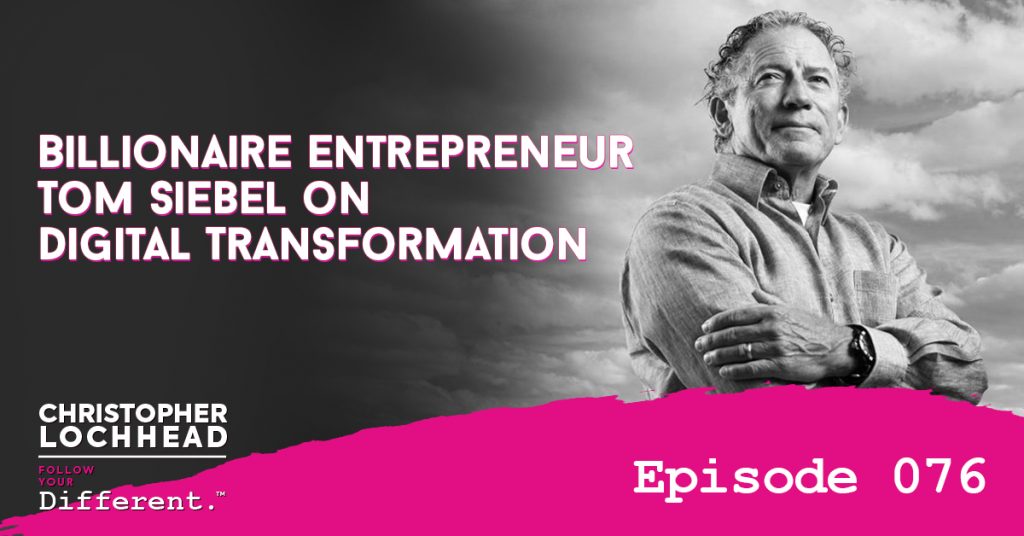
Podcast: Play in new window | Download (Duration: 45:03 — 41.4MB) | Embed
Subscribe: Apple Podcasts | Spotify | Pandora | RSS | More
In today’s episode, Billionaire Entrepreneur Tom Siebel shares some thought-provoking insights on new, leading technologies and its impact on businesses and society. He is the founder of C3.AI, a new software platform that harnesses Big Data, IoT AND AI.
Tom covers in this episode the contents of his book, Digital Transformation, as well as some intriguing ideas about huge US Tech companies.
Silicon Valley Entrepreneurial Giant
Listeners might recall Bruce Clevland, author of “The Traction Gap” and guest in episode 033. He used to work with Tom Siebel at Siebel Systems, which was the category king in the 1st wave of CRM.
In the year 1999, Fortune magazine named Siebel Systems “the fastest growing company in the United States.” In 2006, they merged with Oracle for $5.85 billion.
Digital Transformation
Tom has a brand new book entitled “Digital Transformation.” The book covers giant Megatrends and impacts on business and society. CEOs and senior leaders would find this book highly beneficial to their decision-making process.
“The coming two decades will bring more information technology innovation than the past half-century.” -Tom Siebel, Digital Transformation
Further, he discussed that companies who fail to seize this massive technological growth will be extinct in the future. In the last 30 years, companies that didn’t make the necessary transition required in their industry, cease to exist today.
Continuous Learning and Education
Tom Siebel and his company have a real commitment to their employees: to focus on continuous learning and education. Employees can take online classes via Coursera—in relation to AI, Cloud Computing, Machine Learning, among others. Universities such as Stanford, MIT, and the University of Illinois offers these online courses.
“Things are changing more rapidly so to be on top of these, you must be continuously learning” – Tom Siebel
The company recognizes the employees who completed the courses and awards cash bonuses — ranging from $1500 to $25,000. At the moment, the company is rolling out new incentives — a 15% increase in compensation and an additional equity grant.
“These people are better equipped to do their jobs and to serve customers. This is to advance their careers professionally. They also do feel more empowered, so everybody wins.” – Tom Siebel
To hear more about digital transformation and more relevant information from Tom, download and listen to the episode.
Bio:
Tom Siebel is the Chairman and Chief Executive Officer of C3.ai.
He was the Chairman and CEO of Siebel Systems, which merged with Oracle Corporation in January 2006 for $5.85 billion.
Mr. Siebel is also the Chairman of the Siebel Energy Institute, a global consortium for innovative and collaborative energy research for the public domain.
Mr. Siebel serves on the boards of advisors for the University of Illinois College of Engineering and the University of California at Berkeley College of Engineering.
Mr. Siebel is a graduate of the University of Illinois at Urbana-Champaign, where he received a B.A. in history, an M.B.A, and an M.S. in computer science.
Links:
Digital Transformation: Survive and Thrive in an Era of Mass Extinction
Thomas Siebel – Forbes Profile
We hope you enjoyed this episode of Follow Your Different™! Christopher loves hearing from his listeners. Feel free to email him, connect on Facebook, Twitter, Instagram and subscribe on iTunes!
075 Neil Pearlberg, Surf & Skateboard Podcast/Radio Legend On The “Worst Episode” Ever!
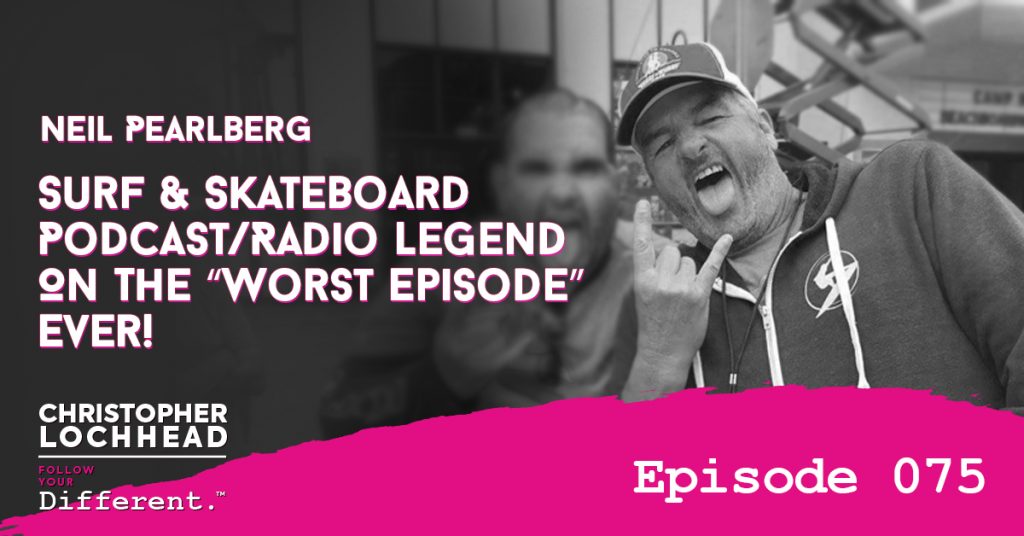
Podcast: Play in new window | Download (Duration: 1:12:17 — 66.3MB) | Embed
Subscribe: Apple Podcasts | Spotify | Pandora | RSS | More
Surf and skateboard podcast host Neil Pearlberg joins us today in this special 4th of July episode dubbed as “The Worst Episode Ever!” This is a funny and silly conversation, just like two buddies hanging out over drinks.
We cannot guarantee that you’d find inspiration or motivation in this episode, but we’re sure, you’d be laughing your brains off listening to this witty exchange of conversation!
Off The Lip Radio Show
Neil Pearlberg hosts the Off The Lip Radio Show (OTL)— a popular radio show and podcast dedicated to surfing, skateboarding and laid back California lifestyle in Santa Cruz. The show is co-hosted by Terry Campion (TC), a skate-shop owner. The show has a wide array of guests and live-music, peppered with the unique humor of Neil and TC.
“Everybody takes life seriously. The show has to be fun! There’s so much seriousness in today’s world.” – Neil Pearlberg
After Neil’s stint as a freelance writer for the Santa Cruz Sentinel, he proposed to KSCO management a program that would cater to the younger generation, since the station’s demographic involved very old listeners. They were off into a rought start, as the KSCO management deemed him as an “non-reliable, non-responsible-kind-person” but he proved them wrong.
Lochhead’s Guesting at OTL
Rich Novak, the founder of innovative skateboard company NHS Fun Factory, introduced Neil to Chris and they’ve been buddies ever since. Chris actually guested in OTL Episode #321 where he complained that he was called Chris Lochhard for the whole 50 minutes of the show.
It was a hilarious exchange of conversation as Chris said this is the first time he met people who don’t give AF about who he was. He also joked about how it was fun to be “disrespected” at times and be regarded based on your hobbies.
“You pick up absolutely no new subscribers cause everybody was googling Lockhard! I was furious! But we went out for dinner and had a great time!” – Christopher Lochhead on his guesting at OTL
More About The Worst Episode Ever
Neil shares more about the guests, the music and topics they cover on OTL. He said the show appealed to the young and young at heart because of their unconventional format and their IDGAF attitude.
“We used to be prepared. We sit down beforehand and do notes. TC and I start on a nice piece and have booklets, then it went to brown paper bags, then it went to napkins. Now we just drink.” – Neil Pearlberg on the preparing for every episode of OTL
He further shared about his fashion sense—the laidback California lifestyle attire—but is now called hobo chic. They teased back and forth about Neil’s current relationship, as his girlfriend, Angela was also present during the interview.
To hear more about Neil Pearlberg and why this episode might be the “Worst Episode” ever, download and listen to the episode.
BIO:
Since September 2009, Neil Pearlberg has written over 200 articles covering the sport of surfing, as well as skateboarding, and soccer, for the Bay Area News Group, & Santa Cruz Waves.
He is also the host of the “Off the Lip Radio Show”, & Hour Local Radio Show aired on Santa Cruz Radio Show KSCO AM 1080, FM 104.1, ksco.com and streamed on Santa Cruz Waves Facebook Page.
Neil has also had published articles in Adventure Sports Journal, National Geographic, Stand Up Paddle Board Magazine.
Links:
We hope you enjoyed Neil Pearlberg on this episode of Follow Your Different™! Christopher loves hearing from his listeners. Feel free to email him, connect on Facebook, Twitter, Instagram and subscribe on iTunes!
074 From Abused Child to Fierce Ph.D. w/Carolyn Colleen, PhD
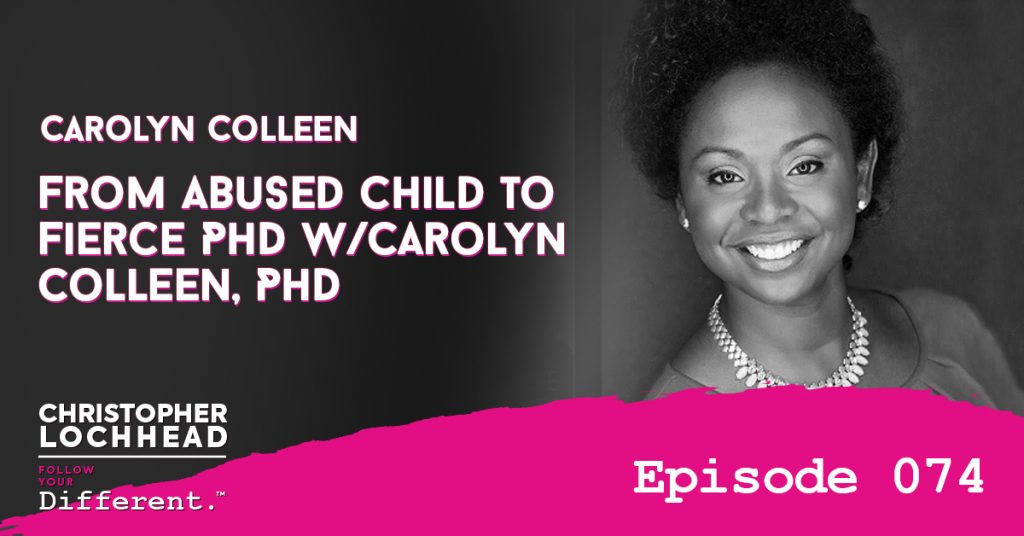
Podcast: Play in new window | Download (Duration: 1:10:59 — 65.1MB) | Embed
Subscribe: Apple Podcasts | Spotify | Pandora | RSS | More
Dr. Carolyn Colleen is a shining example of the fierce power of the human spirit in the defiance of unthinkable abuse. Join us in this riveting conversation about her incredible journey—from surviving with food stamps to gaining her Ph.D. and becoming a celebrated author. This discussion is not only about abuse—it’s about triumph—and it will impact a lot of people’s lives.
The Past Doesn’t Define The Future
Our guest today Dr. Carolyn Colleen, has a Ph.D. in Organizational Leadership from The Chicago School of Professional Psychology. She authored the best selling book FIERCE. On the side, she is a life and business strategist.
She is a woman who commands presence, but surprisingly has struggled so much since childhood, up until she was married.
“As my definition of love evolved, I evolved. I learned to further deepen my definition of love — how I see love in the world. I also have a deeper sense of self-love.” – Carolyn Colleen
Carolyn’s Dark Past
From the time she was four, Carolyn was sexually abused by his teenage neighbor. Unfortunately, the pattern repeated throughout her childhood, even after they relocated.
Carolyn’s mother struggled with mental health. She was a hoarder and have issues with being too trusting with strangers. Her mother provided free lodging and meal for both men and who ended up molesting both Carolyn and her sister.
“There was a time when I defined myself as being someone who was put here to be used and abused.” – Carolyn Colleen
Changing Perspective
People who have experienced trauma or who suffered PTSD may have flashbacks when exposed to a certain trigger—such as a certain sound, smell or mannerism of another person. Victims of abuse are reminded every day of their unfortunate experiences because of these triggers.
As a victim of abuse herself, Carolyn says her perspective is different. Memories pop up daily, but what she does with it and how it affects her is different now.
She is now at peace with herself; developed a gratitude attitude and has acknowledged that her experiences made her stronger.
“Coming from a place of trauma—physical, sexual and emotional abuse—I’ve done a lot of self-work and realize when things might trigger me and how it affects my life. As I continually grew, I realized what happened to me doesn’t define me .” – Carolyn Colleen
To hear more about the amazing journey of Carolyn, download and listen to the episode.
Bio:
Carolyn Colleen holds a Ph.D. in Organizational Leadership from The Chicago School of Professional Psychology and a Masters in Business with a focus in Servant Leadership from Viterbo University.
Dr. Colleen is speaker, author, and coach.
She was born and raised in the Midwestern United States. She describes herself as a FIERCE mother, daughter, sister, and friend.
Out of sheer necessity, Carolyn developed the F.I.E.R.C.E. 5 method, which helped her grow from a downtrodden, scared and ragged victim, standing in a food line at the Salvation Army, to the confident and successful person she is today, living a happy life she never realized she deserved.,
Carolyn took up the challenge of writing a book about her experiences.
Now, with her book completed, she hopes that through sharing her story she will provide others with the hope, resources, and willpower needed so that they too can live the life they deserve.
Links:
We hope you enjoyed Carolyn Colleen on this episode of Follow Your Different™! Christopher loves hearing from his listeners. Feel free to email him, connect on Facebook, Twitter, Instagram and subscribe on iTunes!
073 Why Dyslexia is a Superpower w/ Gibby Booth Jasper
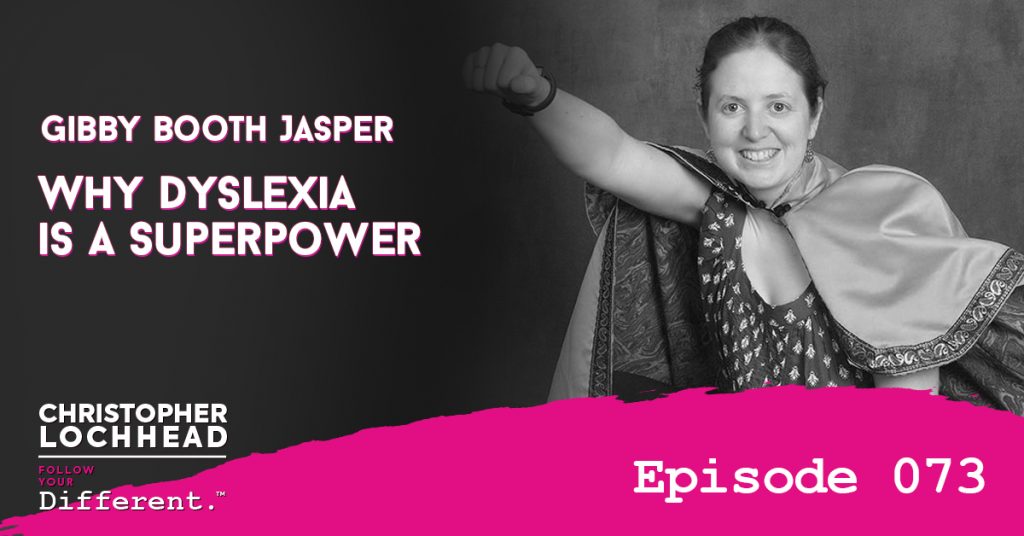
Podcast: Play in new window | Download (Duration: 1:12:20 — 66.3MB) | Embed
Subscribe: Apple Podcasts | Spotify | Pandora | RSS | More
Gibby Booth Jasper, host of podcast Dyslexia is a Superpower, joins us today for a powerful dialogue about the learning difference Dyslexia. As a coach and advocate, Gibby talks about real life experiences of Dyslexics as well as the challenges and triumphs that go along with it.
Dyslexia is a Superpower
Gibby Booth Jasper believes that the real value of being dyslexic is the power of having a different mind. Dyslexics look at problems differently. It enables different solutions and in turn develops a person’s tenacity and determination.
Many people look at dyslexia as a disability. However, it can be noted that a learning difference is never a hindrance to achieve personal goals. Just look at famous dyslexic people such as John F. Kennedy, George Washington, Albert Einstein, Walt Disney, Richard Branson and Steven Spielberg, to name a few.
“They say everybody has a mountain to climb, but with dyslexia, your mountain has lava flowing, it has wild boars and all these obstacles. When you finally get to the top, you are able to accomplish so much more.” – Gibby Booth Jasper
Dyslexics Daily Struggle
Gibby believes dyslexics can connect the dots and solve problems differently. However, society has put on a standard on activities like writing, reading, and solving Math—which makes it hard for dyslexics to cope. Other than that, they do have spatial awareness problems, which is the difficulty of differentiating the left and the right.
Gibby and Christopher exchanged personal experiences, as both are dyslexic themselves. Gibby recounter how traumatized she is with gas stations, as she cannot figure out moving forward and backward with her car. Christopher also shared some experiences, especially in self-check out counters in grocery stores and with tipping and counting money.
“Spatial problems, self-checkout counters, counting money. Those are the kind of things that can be normally linked to dyslexia, so if you do see someone struggling, that might be it. Go help that someone” – Gibby Booth Jasper
Empowering Dyslexics
In dealing with dyslexia, Gibby stated the importance of informing their child that they are unique and different in a good way. Parents must reassure their children that nothing is wrong with them and assist them in building self-confidence.
“I think being able to look at it as ‘letting go of things because I can’t control them.’ Just have a sense of humor, because, in the grand scheme of life, it doesn’t matter” – Gibby Booth Jasper on struggles in doing daily activities
The real challenge for a dyslexic lies on their ability to play out strengths and to empower themselves while dealing with the existing society.
We hope you enjoyed Gibby Booth Jasper on this episode of Follow Your Different™! Christopher loves hearing from his listeners. Feel free to email him, connect on Facebook, Twitter, Instagram and subscribe on iTunes!
BIO:
Links:
072 Why Steve Jobs, Jeff Bezos & many others turned to “The Coach” Bill Campbell
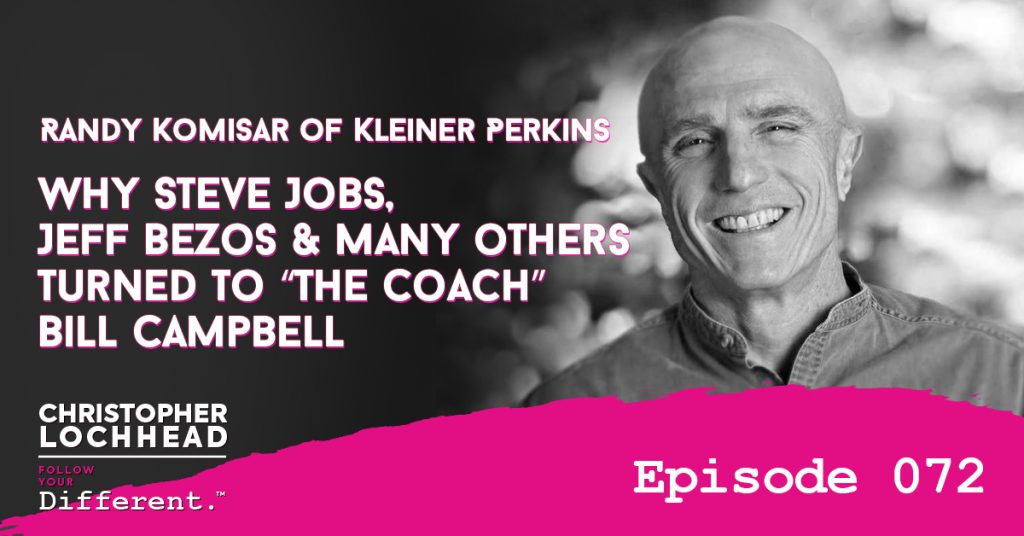
Podcast: Play in new window | Download (Duration: 56:14 — 51.5MB) | Embed
Subscribe: Apple Podcasts | Spotify | Pandora | RSS | More
Randy Komisar of Kleiner Perkins joins us today to celebrate the life and lessons of legendary Silicon Valley coach, late Bill Campbell. Guest Randy Komisar, along with colleague Paul Martino of Bullpen Capital, came together to capture Bill in a podcast. Bill was the coach to Steve Jobs, Jeff Bezos, and countless Silicon Valley legends.
Depicting The Real Bill
Bill was featured in a book called Trillion Dollar Coach, prior to the release of Randy and Paul’s podcast. The content of the book were flattering, but the title was so off-putting. It sets the wrong tone for understanding what BIll is all about.
“Bill wasn’t a guy with a big theory. He’s not that guy who has rules like ‘10 rules to be successful.’ He was somebody who connected incredibly well with who you were and what you need and was able to get you there.” – Randy Komisar
Bill was associated with a trillion dollars worth of value creation. He was not a highfalutin guy who would’ve wanted to be in the cover of a book. They were able to capture the real Bill, more than what the book portrayed him to be, through this podcast.
Paying it Forward
Randy and Paul had the opportunity to learn and share their respect and admiration for Bill and they want to pay it forward, through the production of their podcast. They wish that the entrepreneurs for the generations to come would be able to do the same.
Entrepreneurs could get a lot of inspiration from Bill. Randy even cited that if it was not for Bill, he would have quit business a long time ago.
“Bill made business interesting for me and many people because he made it about people, not money.” – Randy Komisar
Learnings From The Late Bill Campbell
One important point from this discussion was the difference in doing what is right versus what is smart. Bill believes smart people are great at rationalizing. Most of these people, though, still tend to overthink a problem and justify doing the wrong things.
“The right thing and the smart thing aren’t necessarily the same. The right thing is worth doing, but the smart thing needs a lot of consideration. It may be smart because it allows you to do the wrong.” – Randy Komisar
This conversation with Randy Komisar is jam-packed with Bill Campbell’s wisdom in entrepreneurship, people management, Silicon Valley legacy.
To hear more about Why Steve Jobs, Jeff Bezos & many others turned to “The Coach” Bill Campbell and more relevant information from Randy, download and listen to the episode.
BIO:
Links:
Straight Talk for Startups – Book
The Monk and the Riddle: The Art of Creating a Life While Making a Living – Book
Executives Launch Podcast To Pass On Lessons From Bill Campbell, Coach To Silicon Valley Stars
Executives Launch Podcast To Pass On Lessons From Bill Campbell, Coach To Silicon Valley Stars
We hope you enjoyed this episode of Follow Your Different™! Christopher loves hearing from his listeners. Feel free to email him, connect on Facebook, Twitter, Instagram and subscribe on iTunes!
071 How to design a company that people are lining up to work for
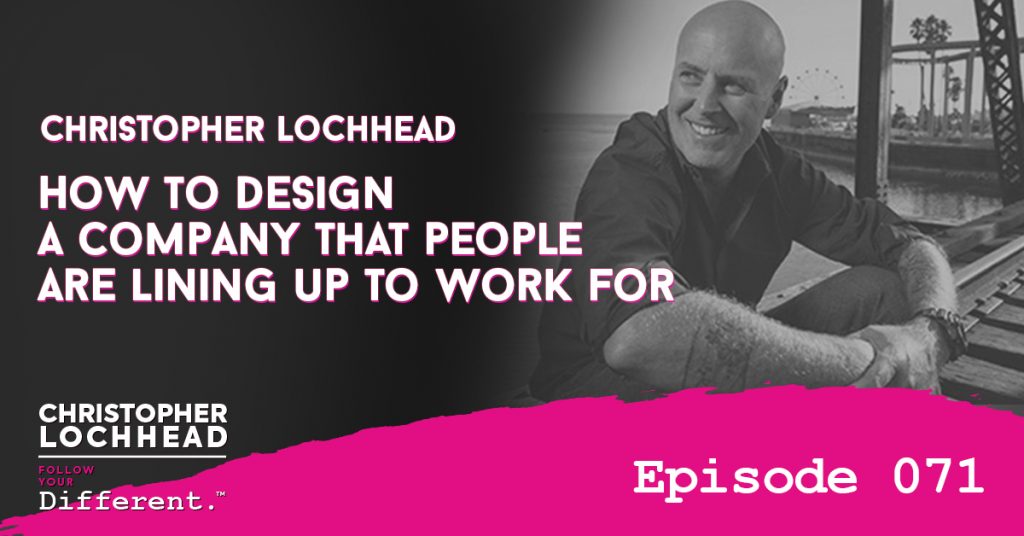
Podcast: Play in new window | Download (Duration: 14:17 — 13.1MB) | Embed
Subscribe: Apple Podcasts | Spotify | Pandora | RSS | More
Inspired by his conversation with Bob Evans at Cloud Wars Live, Christopher Lochhead talks about radical ideas involving employee happiness, growth, and satisfaction as key determinants in designing a company that people are lining up to work for.
Americans are Unhappy at Work
Christopher shares the alarming truth of today’s workforce: Americans are unhappy with their jobs. In fact, in episode 056, guest Jim Harter discussed the rapid decline in the rate of productivity at work. Thirty-four percent (34%) of the 37.2 million American respondents surveyed said that they were not engaged.
“If most employees say they are not engaged, and most managers say they are not engaged, then there’s something off with the typical work environment—what most people would call culture.” – Christopher Lochhead
Algebra of Happiness
In episode 052, Professor Scott Galloway related how happiness can be plotted as a graph.
A person’s happiness level starts relatively high until it slowly declines in a phase called “shit gets real stage.” Contributors to these low levels may include raising children, financial instability and crazy work life. After the dip, it goes up over time as a person reaches age 45 to 55.
Amazing Culture at CutCo
Listeners might remember from episode 044, Dan Casetta and his amazing culture at Cutco. Inexperienced high school graduates and working students make up his workforce. The company runs by its mantra, “changing lives while selling knives” and it has been successful with its recruitment, training, and inculturation.
The Takeaway
How do these ideas intersect? The vast majority of people felt disengaged at work. However, this is not the case at Cutco. Christopher acknowledges the industries today have a cultural, engagement problem.
“If part of creating jobs is creating an environment for them to become fully self-actualized, then most companies are dramatically failing.” – Christopher Lochhead
If companies would only infuse into their culture the mentality of personality development—where they teach employees life skills, career skills, sales skills, and relationship skills—then people would definitely be lining up to work for them.
Christopher poses two points to ponder. First, could we change the level of engagement? Second, can we actually, meaningfully increase the amount of happiness the people have during the core part of their career?
To hear more about Christopher’s take on designing a company that people are lining up to work for, download and listen to the episode. Got a question for Christopher? Email him at bl*******@******ad.com.
Link:
Book-It’s The Manager by Jim Harter
*******@******ad.com. Link: Book – It’s The Manager by Jim Harter Episode 056 – Jim Harter Episode 052 – Professor Scott Galloway Episode 044 – Dan Casetta We hope you enjoyed this episode of Follow Your Different™! Christopher loves hearing from his listeners. Feel free to email him, connect on Facebook, Twitter, Instagram and subscribe on iTunes!”> Jim Harter – *********@******ad.com.%20%20Link:%20%20Book%20-%20It%E2%80%99s%20The%20Manager%20by%20Jim%20Harter%20%20Episode%20056%20-%20Jim%20Harter%20%20Episode%20052%20-%20Professor%20Scott%20Galloway%20%20Episode%20044%20-%20Dan%20Casetta%20%20We%20hope%20you%20enjoyed%20this%20episode%20of%20Follow%20Your%20Different%E2%84%A2!%20Christopher%20loves%20hearing%20from%20his%20listeners.%20Feel%20free%20to%C2%A0email%C2%A0him,%20connect%20on%C2%A0Facebook,%C2%A0Twitter,%C2%A0Instagram%C2%A0and%20subscribe%20on%C2%A0iTunes!”>Episode 056
Professor Scott Galloway – Episode 052
We hope you enjoyed this episode of Follow Your Different™! Christopher loves hearing from his listeners. Feel free to email him, connect on Facebook, Twitter, Instagram and subscribe on iTunes!
070 Alternative Investing w/ Eric Satz
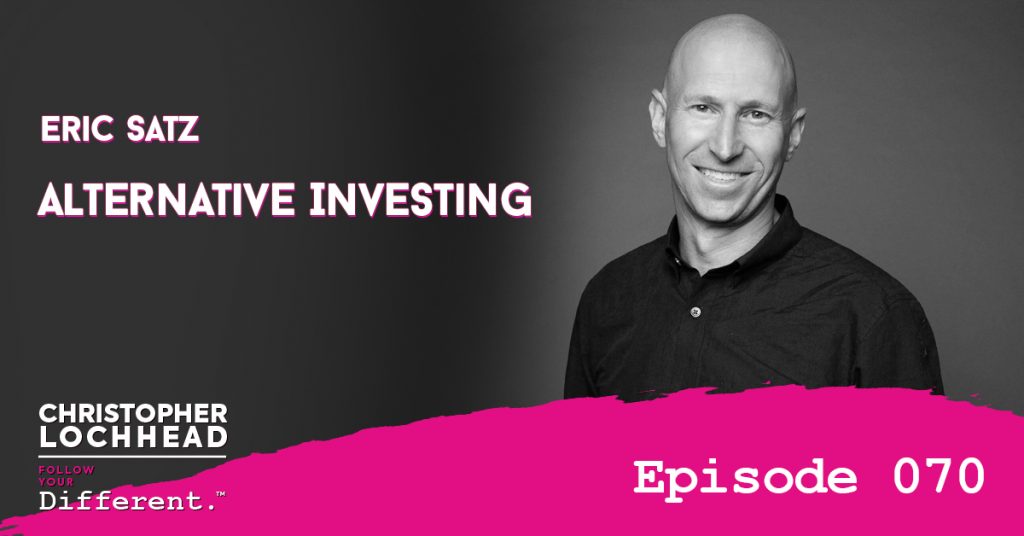
Podcast: Play in new window | Download (Duration: 1:02:11 — 57.0MB) | Embed
Subscribe: Apple Podcasts | Spotify | Pandora | RSS | More
Eric Satz, CEO of Alto IRA and retirement planning advocate, joins us in today’s episode. He is on a mission to enable everyone to invest their retirement money in alternative investments. He actively campaigns for drastic information dissemination among retirees to save them from potential poverty in the future.
Diversifying Investments
Regular listeners might remember the teachings of prior guests like David Osborne or Pat Hiban or Dorie Clark. These smart people recommend a diverse investment strategy that creates multiple income streams over time. Such a strategy will help investors achieve the amazing goal of having investments pay for all expenses.
Eric Satz also promulgates diversifying investments, especially for retirees. He acknowledges the importance of various platforms today, where resources can be easily uploaded and disseminated. Eric and his team from Alto IRA provide information on alternative investments such as private startups, growth companies, real estate, loans, and digital assets and currencies.
“The idea is to open up areas of investment that have the potential to generate higher returns, higher yield and greater levels of current income—so that we are all in a better position to retire.” – Eric Satz
Alarming Truths About Retirement
Eric started his mission with straightforward and entrepreneurial motivation. There is a huge market opportunity of 30 trillion US dollars, sitting in retirement savings. However, only 1% of this amount is invested in alternative assets, instead of around 10 or 20%.
“Investing is proactive, saving is passive. If we don’t change the way we invest, 25 million Americans—elderly Americans—basically will be living in poverty.” – Eric Satz
Eric wanted to fight the conventional wisdom of financial advisors. He considers America to be under a retirement crisis up until 2050. He promotes diversification in investing in businesses commonly considered by upper-middle-class and the elites, like real estate.
Save and Invest
Further, into this episode, Lochhead mentions the importance of having investments while saving on the side.
He further says that retirees should take the opportunity to invest aggressively because of the changing of public-market-private-market dynamics. With a projected 46% increase in capital gains annually, an avid saver can plot his or her retirement early.
To hear more about alternative investing and more relevant information from Eric, download and listen to the episode.
Bio:
Eric Satz, Founder/CEO Alto IRA
An entrepreneur and former investment banker, Eric worked for DLJ/Credit Suisse First Boston before co-founding Currenex, Plumgood Food, and Tennessee Community Ventures, a VC firm.
Eric served on the Board of the TVA from 2015-January 2019, and he teaches an entrepreneurship class to high school students.
A Miami native and diehard ‘Canes and Dolphins fan, Eric went to Amherst College.
After years in NYC and then San Francisco, he and his wife moved to Nashville, her hometown, to raise their kids.
When he’s not breathing life into startup companies, Eric loves to ski, play soccer, and practice yoga.
Links:
Alto Ira Raises Seed Round – Hypepotamus
Will Wall Street be able to earn the trust of younger investors
Book: Rescuing Retirement: A Plan to Guarantee Retirement Security for All Americans
We hope you enjoyed Eric Satz on this episode of Follow Your Different™! Christopher loves hearing from his listeners. Feel free to email him, connect on Facebook, Twitter, Instagram and subscribe on iTunes!

